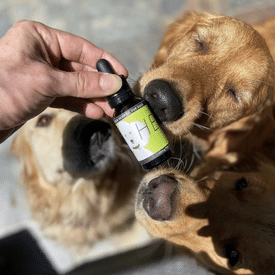CBD for Kidney Disease in Dogs

Due to a variety of circumstances, like poor diet and environmental toxins, kidney disease in dogs and cats has become a serious and all too common problem. The tools used in traditional veterinary medicine can be limited, especially when maintaining a good quality of life for those animals afflicted with kidney disease. Holistic tools like Full Spectrum Hemp CBD for Kidney disease in dogs and cats can help manage your pet’s symptoms and you might not have thought about using a full spectrum hemp extract for your cat or dog with kidney disease, but it’s actually a great tool to use in their health regimen. While a full spectrum hemp extract will not technically treat renal disease, it can be a critical tool for symptom management and helping bring the body back to balance.
What is Kidney Disease?
Kidney Disease, also known as Renal Disease, is when there is acute or chronic damage done to the kidneys. The kidneys are vital for maintaining health; they act as the body’s filtration system for blood and eliminate waste products by producing urine. The kidneys are also responsible for producing a specific hormone to produce red blood cells within the bone marrow. A specific part of the kidney called the Loop of Henle is especially critical for maintaining hydration and electrolyte levels. When the kidneys are affected negatively by acute damage (poison ingestion) or chronic damage (low moisture diet, household/environmental toxins), their function is compromised and symptoms will begin to appear due to waste not being able to leave the body efficiently.
There are two types of kidney disease: Acute and Chronic. Acute kidney disease occurs after ingestion of a toxin, like antifreeze or grapes. Chronic kidney disease is a slowly progressing degenerative disease due to several factors, which we will discuss.
What Causes Kidney Disease in Dogs?
There are several factors associated with kidney disease in dogs. First, genetics play a key role in the development of chronic kidney disease (CKD). Breeds like Cocker Spaniels, Bull Terriers, and Shih-Tzus are more prone to this disease. Second, other underlying health conditions (genetic or not) like cardiac disease, hypertension (high blood pressure), and periodontal (dental) disease all play a role in determining your pet’s likelihood of CKD.
There are a few other causative factors for CKD that can be prevented in many cases: Diet, Hydration, and Toxins.
Poor diet is the primary preventable cause of CKD in dogs. Feeding dry, ultra-processed foods like kibble to dogs and cats will increase the likelihood of chronic dehydration and inflammation. Dehydration and inflammation cause a direct impact on renal function. There is a way to prevent both of these problems: feeding a fresh, moisture-rich food with as few synthetic vitamins and minerals as possible. There are so many amazing brands to choose from these days. There are even brands of raw/fresh foods specifically formulated for kidney issues! If your pet already has kidney disease, working with a holistic vet or nutritionist to custom tailor their diet is a great idea.
The other largely preventable cause of kidney damage and disease is the ingestion of toxins, whether acute or chronic. We know as pet parents that we need make sure our pets do not get directly/acutely exposed to toxins from accidental ingestion. Substances such as antifreeze, grapes, or human pharmaceutical medications can be acutely toxic to the kidneys. However, there are other toxins our pets are exposed to on a daily basis that we might not be aware are doing our pets harm. Scented candles, air fresheners, plug-ins, carpet powders, upholstery cleaners, flame retardants, degreasers, water repellants (used on raincoats and clothing), and non-stick cookware all contain chemicals called PFAS that are known to have damaging effects on the kidneys. It’s important to do your best to reduce or eliminate these products from your home, for your health, and for your pet.
Symptoms of Kidney Disease in Dogs
The first symptom many pet parents notice is their pet needing to drink more water and thus needing to urinate more frequently. The kidneys are responsible for concentrating urine. When they cannot function properly, urine concentration is greatly decreased, resulting in excess urine being produced. Your pet has to keep up with this excessive fluid loss by drinking more. The cycle of polydipsia (excessive drinking) and polyuria (excessive urination) is endless when a dog is experiencing a loss of kidney function.
As the disease progresses, more severe symptoms will begin to appear. Abdominal tenderness will be present due to pain and inflammation. Since the kidneys are responsible for producing a hormone that stimulates red blood cell production, when they are impaired, anemia can occur, resulting in pale gums and secondary symptoms like lethargy. Lethargy (sluggishness) will begin to show due to low red blood cell and potassium levels. Due to the damage caused to the kidney’s vital tubule, the loop of Henle, muscles cannot maintain proper electrolyte balance and muscle weakness and thus atrophy begins to occur as well.
Anorexia (poor/no appetite) is also common due to nausea. Vomiting is another issue and can vary in severity and frequency depending on the stage of kidney disease.
Many of the more severe symptoms seen with kidney disease are due to a condition secondary to the disease, called uremia. Uremia occurs when there are excessively high levels of urea (a waste product) in the bloodstream. When this condition is present, many mucosal membranes become irritated. This can lead to ulcerations in the mouth and GI tract, making the condition even more painful for your pet. Sometimes pets will vomit up digested blood, resembling coffee grounds, which is a sign of ulcerations within the upper GI tract due to uremia.
In late-stage chronic kidney disease in dogs, a system in the body that regulates blood pressure malfunctions and begins to create chronically high blood pressure. Without proper intervention to manage blood pressure, your pet can experience acute blindness that can become permanent if not managed by your veterinarian.
These are all common signs of the advancement of kidney disease in dogs and need to be taken seriously. It’s always important to monitor your dog’s activity levels, water intake/hydration, and attitude to try to get an early idea that something is wrong. Kidney disease can be fatal, so it’s very important to get to the vet when you see any of these symptoms pop up. Unfortunately, due to the self-protecting nature of our pets, many of these symptoms don’t appear until the disease has progressed to a relatively advanced stage.
Full Spectrum Hemp CBD for Kidney Disease in Dogs
We already know that a Full Spectrum Hemp Extract (FSHE) is one of the best, if not the best anti-inflammatory and pain reliever out there. Chronic kidney disease is a disease of inflammation and malfunction, two things that FSHE does an outstanding job addressing and managing. We know that CKD can cause inflammation and irritation to the mucous membranes, and FSHE, especially when given trans-mucosally (along the gumline is our favorite way), acts on contact to alleviate this painful and irritating condition.
A full-spectrum hemp extract is an amazingly effective and safe tool in managing kidney disease, whether acute or chronic. Research has shown that FSHE is an effective way to manage nausea and lack of appetite, which is critical for chronic kidney disease (CKD) since it’s very important that your pet continue eating while dealing with the disease. In addition, FSHE has been shown to be anti-emetic (anti-vomiting). Just these two symptoms alone, if managed with FSHE, can be critical for an animal with CKD.
As we mentioned previously, the kidneys’ proper function is important to maintaining healthy blood pressure levels. When the kidneys are damaged or diseased, elevated blood pressure levels can occur. Full Spectrum Hemp Extract is an effective tool for lowering blood pressure, making this another important reason to use Full Spectrum Hemp Extract CBD for kidney disease in dogs.
Final Thoughts
Kidney disease is an illness plaguing many pets currently. Diet, environment, and genetics all play a key role in understanding how this disease occurs and can help us prevent it. If we are unable to prevent it or already have a pet with this condition, using a Full Spectrum Hemp Extract CBD for dogs with kidney disease is not only an excellent option for symptom management but will also work to bring the body back into balance (homeostasis) as much as possible. Full Spectrum Hemp CBD for dogs and cats with kidney disease can help bring a higher quality of life to your pet and hopefully add to their quantity of life as well.
Discuss your treatment and care options with an integrative or holistic vet, since there are several alternative therapies available to manage kidney disease. Options include Traditional Chinese Veterinary Medicine (TCVM), which can consist of multiple therapies including acupuncture, nutritional therapy, and Chinese Herbal Therapy. Chiropractic is also very helpful for managing pain, inflammation, and regulating the central nervous system. Homeopathy can also be an incredibly safe and effective tool in managing kidney disease in dogs when using a skilled practitioner. Taking an integrative approach to managing kidney disease is critical to give your pet the best quality of life while dealing with this disease.
















